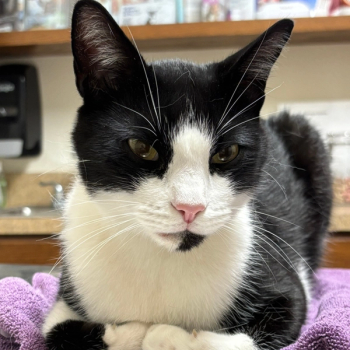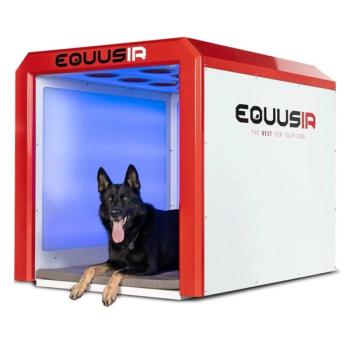
- dvm360 February 2022
- Volume 53
- Issue 2
Puppy burns mouth and throat on batteries
Nova's story warns of a harmful item pet owners should bear in mind this holiday season, plus how the Pet Poison Helpline is raising awareness of common household hazards.
Spencer Howald in London, Ontario, Canada recently arrived home to find her puppy, Nova, chewing on an alkaline battery, thus suffering from mouth and tongue burns.
"We left a package of batteries behind the gaming station on our fireplace mantle and apparently it had fallen to the floor. We noticed a black spot on the couch and realized Nova had been chewing on one of the batteries," Howald said, in an organizational release.1
"There was a puncture, the battery was leaking, and it caused blisters on her tongue and gums. We called the emergency pet hospital, who had us contact the experts at Pet Poison Helpline,” she added.
At London Regional Veterinary Emergency and Referral Hospital, the veterinary staff discovered Nova had mouth and tongue ulcerations and put her on medication for vomiting and nausea. They also cleaned her mouth thoroughly with an oral dental rinse.
The team then administered a sucralfate slurry to support healing of esophagus ulcers, and GIT and an H2 blocker to reduce stomach acid production. Additionally, the staff gave her pain medication and placed her on a watered-down diet. They also performed an abdominal x-ray which fortunately revealed Nova had not ingested any of the batteries.
"It was scary the day we brought her home,” Howald said.1 "She was crying and there was nothing more we could do. She's doing really well now, all things considered, and she was back to her normal personality by the next day. It is really up to the pet owner to keep an eye out for these dangers."
Nova visited her regular veterinarian a week after the incident who deemed her to be in good condition.
Insight from the Pet Poison Helpline senior veterinary toxicologist
“I think what was interesting about Nova’s story is how quickly her clinical signs developed. When an animal ingests batteries or punctures and chews on batteries, they can develop those ulcers in the mouth and tongue and esophagus. A lot of times, we don't see those for maybe, 12 hours, 24 hours afterward,” remarked Renee Schmid, DVM, DABVT, DABT, senior veterinary toxicologist at Pet Poison Helpline and manager of Veterinary Medicine and Professional Services, in an interview with dvm360®.
“In [Nova’s] case, she had significant sloughing off the tongue within just a couple of hours after chewing on [the battery]. So that was something that really struck us as interesting that she responded so quickly to the alkaline substance and just how much damage she had,” added Schmid.
Schmid explained that a pet chewing or swallowing batteries is a common call the Pet Poison Helpline receives, stating, “The pet will chew on a remote control, or they'll chew on a toy that has batteries in it and by default, they end up chewing on those batteries as well.”
“Especially this time of year when you're starting to get into Christmas presents, different decorations that are around the house or toys that make noise and things like that…our calls certainly increase in frequency,” she continued.
According to the major battery manufacturer, Duracell,2 the 3 weeks the most batteries are sold are during the year are Black Friday, before Christmas, and after Christmas. Alkaline batteries are often used in electronic toys and can be extremely harmful to pets when ingested or punctured, causing severe tissue damage in the mouth, esophagus, and gastrointestinal tract which may require surgical or endoscopic removal, according to Schmid.1 Though Nova’s incident involved alkaline batteries, “button-sized” lithium batteries can be even more dangerous as they can be easily swallowed, and cause burns from the electrical current of the battery.1
A few additional
Toxin Tails
Nova is among the 12 cases highlighted this year in Pet Poison Helpline’s Toxin Tails campaign. This initiative was launched to inform the veterinary community and pet parents on the various pet poison hazards. All the pets featured in Toxin Tails have been successfully treated and have fully recovered.
“Toxins Tails was designed to be a community outreach to help educate pet owners on different items that maybe they weren't really aware of that might be a concern for dogs or cats,” Schmid said, adding, “We wanted to provide something that shows real-life stories, something that really happened, but had a successful and healthy outcome.”
Vote for your favorite Toxin Tales story here:
Reference
- Probing pooch burns mouth and throat on alkaline batteries. News release. Pet Poison Helpline. December 8, 2021. Accessed December 8, 2021.
https://www.prnewswire.com/news-releases/probing-pooch-burns-mouth-and-throat-on-alkaline-batteries-301439701.html - New survey finds holiday toy shoppers still forgetting to buy batteries. News release. Procter & Gamble. November 19, 2014. Accessed December 9, 2021. https://www.businesswire.com/news/home/20141119006579/en/New-Survey-Finds-Holiday-Toy-Shoppers-Still-Forgetting-to-Buy-Batteries
Articles in this issue
almost 4 years ago
Enter the 2022 dvm360® Hospital Design Competitionalmost 4 years ago
What’s new in 2022almost 4 years ago
Making room at the tablealmost 4 years ago
10 Dental hacks to enhance your veterinary practice in 2022almost 4 years ago
Do we need a paradigm shift in canine neutering?almost 4 years ago
Implementing virtual care in veterinary practicealmost 4 years ago
Commentary: compensating trainees as paid staffalmost 4 years ago
How research of an FIP treatment for cats is saving human livesalmost 4 years ago
At-home care is crucial to combating periodontal diseasealmost 4 years ago
The dilemma: approaching retirementNewsletter
From exam room tips to practice management insights, get trusted veterinary news delivered straight to your inbox—subscribe to dvm360.





